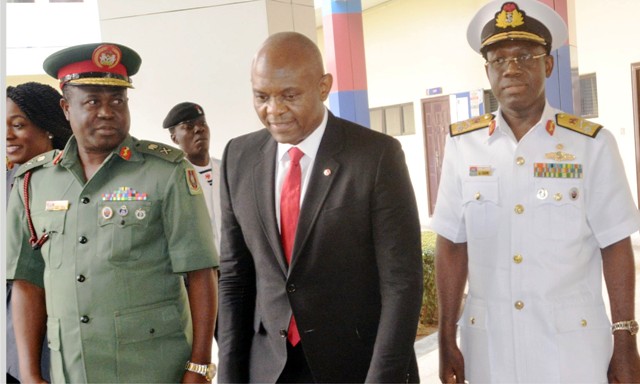Editorial
Checking Nigeria’s Debt Profile

The Minister of Finance, Budget and National Planning, Zainab Ahmed, has revealed that Nigeria’s public debt would hit over N38 trillion by December 2021. She made the statement while defending the 2021 budget proposals at the sitting of the Senate Committee on Local and Foreign Loans, recently.
Further, the Finance Minister disclosed that the total public debt stock comprising external and domestic debts of states and the Federal Government as well as the Federal Capital Territory, (FCT), stood at N31.01 trillion ($85.90 billion) as at June 30, 2020.
According to her, the debt would rise to N32.51 trillion by December, 2020 and N38.68 trillion by December 31, 2021. This means that Nigeria will borrow N6.17 trillion in 2021. Zainab also hinted that the Federal Government would borrow $2.1 billion from Brazil to finance agriculture.
The recurring circle of borrowing is so much today, that it has left many Nigerians wondering whether the government is actually on a rescue mission. This appears so when the interest of the next generation is not being contemplated. We equally wonder whether the authorities in Abuja are interested in the repayment of these loans.
Indeed, the current state of our growing public debt profile is scary. Official data indicate that total debt grew from N12.118 trillion in May 2015, to N12.6 trillion in December, 2015, N17.36 trillion in 2016, N21.725 trillion in 2017, N24.387 trillion in 2018 and N27.401 trillion in 2019. The figures sky-rocketed to startling levels in 2020 with the active collusion of the Ninth National Assembly, (NASS).
In the early years of the Muhammadu Buhari administration, figures from the Debt Management Office (DMO) indicated that Nigeria’s total debt increased by about 90% between December 2015 and March 2018, from about N12.6 trillion to about N22.71 trillion, and that total domestic and external debt stock of the federal, 36 state governments and the FCT stood at N22.38 trillion or $73.21 billion on June 30, 2018.
Recall that this particular NASS approved a whooping N10.08 trillion or $28 billion loan for the Buhari administration within a year. With the latest public borrowings of N8.7 trillion and N5.51 trillion accompanying the approvals of the 2020 federal budget, the overall public debt position has risen to about N41.6 trillion.
These recent loans have come from various sources; $3.4 billion loan from the International Monetary Fund, (IMF), $2.5 billion loan from the World Bank, $1 billion loan from the African Development Bank, (AfDB), N850 billion domestic capital market loans and a host of others.
The Federal Government had earlier in the year planned to take N2 trillion from the current N10 trillion pension funds to finance the development of infrastructure, following a decision taken at a recent meeting of the National Economic Council (NEC) under the chairmanship of the Vice President, Yemi Osinbajo. An articulation of the current borrowing strategies of this administration demonstrates the downward and questionable direction of the economy.
The situation has generated more questions than answers. It is sickening that the government has been pig-headedly proceeding with the procurement of these liabilities despite reservations by stakeholders in respect of the equitable spread of the projects, possibilities of seamless repayment plan and viability of some of the projects for which the loans are being sought.
The usual response by the authorities is that following from the debt-to-gross domestic product (GDP) ratio criteria, the country is currently under borrowed. They, however, fail to educate Nigerians that the debt service-to-revenue ratio is unfavourable. The present debt service-to-revenue ratio is alarmingly over 50%. With this huge debt and repayment quotient, what will be the country’s future creditworthiness?
Are issues of repayment considered when these loans are approved, particularly when it is obvious that any incoming administration in 2023 will be inheriting a heavy debt burden and thus, will find it difficult to operate? Again, in the event of a future sovereign default, what remedies are in place to address the problem or what national assets would have to be sold to service the debts? The unfortunate public debt situation in Zambia and Kenya that ran into serious crises in this regard are quite instructive.
The role of NASS in this matter has intensified the problem. This NASS does not appear competent to query any loan or other agenda of Buhari. Where then are the expected benefits derivable from the checks and balances of the presidential system of government, which is designed to enhance governance in the pursuit of the common good?
No one is against obtaining loans if they are attached to viable projects. However, we are disturbed about the borrowing spree under President Muhammadu Buhari. Something drastic has to be done to arrest this undesirable trend. Who will save us from this menace? Since the current government came into power in May 2015, its mantra seems to be that of “borrow, borrow and borrow” until there is no more money to borrow anywhere.
What the government should do now is to set up monitoring mechanisms on the performance of loans, and mobilise funds within the country to stop the borrowings, at least in the interim. Nigeria can do better without these loans. We urgently need to understand that we are in a dreadful race to the bottom with the current ungoverned craving for a loan.
Editorial
Resurgence Of Illegal Structures In PH
Editorial
Certificate Forgery, Loss Of Public Trust

Editorial
In Support of Ogoni 9 Pardon

-
Politics4 days ago
Kebbi Schoolgirls’ Abduction Tragic, Unacceptable – Northern Govs
-
News3 days ago
Kalabaris Celebrate New Year Amid Fanfare
-
Sports5 days ago
Winners emerge at TotalEnergies charity golf tourney
-

 Business4 days ago
Business4 days ago‘Entrepreneurs, Not Foreign Aid Drive Nigeria’s Growth’
-
News4 days ago
FG Scraps Mother Tongue As Teaching Language In Primary Schools
-
Health4 days ago
Nch Technical Session Reviews 35 Memos …Sets Stage For Council Deliberations
-

 Politics4 days ago
Politics4 days agoOsun 2026: INEC Challenges Political Parties On Lawful Primaries
-
News3 days ago
Eastern Port Police Boss Promises On Crime-Free Operations

